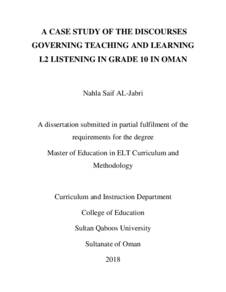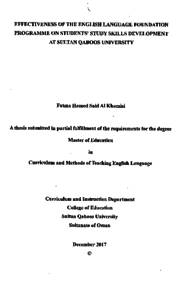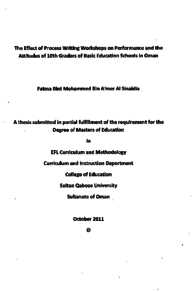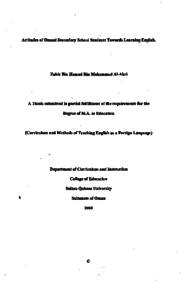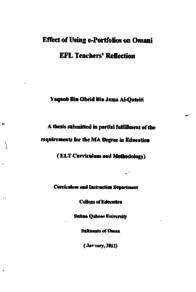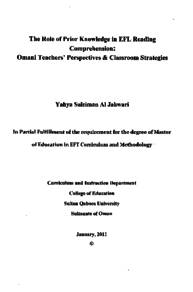Document
A case study of the discourses governing teaching and learning L2 listening in grade 10 in Oman.
Gregorian
2018
Language
English
English abstract
This study investigated the teaching of L2 listening in grade 10 in Oman using. It qualitatively studied the various spoken and written discourses pertinent to teaching and learning L2 listening in order to identify the leading facets contributing to grade 10 students' low performance in listening. Hence, the study addressed the research questions that targeted the key discourses found in the grade 10 English Language Curriculum about teaching and learning L2 listening. As well, it examined the discourses that inform the views of the grade 10 English language curriculum designers at the Ministry of Education, the grade 10 English language teachers, supervisors, and grade 10 students.
The sample consisted of 10 participants residing in Al-Batinah North Governorate; namely, 2 ELT supervisors, 2 senior teachers, 2 grade 10 teachers and 3 grade 10 students.
Additionally, it involved a curriculum designer from the Ministry of Education. Data were collected through semi-structured interviews and a focused-group discussion.
The analysis of the data revealed that the participants hold differing perspectives regarding teaching and learning L2 listening. With regard to the grade 10 English language curriculum, the interviewed grade 10 teachers and supervisors believed that the curriculum lacked authentic listening tasks while the curriculum designer claimed that it was well- designed to suit grade 10 students' needs. According to the instruction, teachers and students confirmed following the three phases of teaching listening recommended in the grade 10 teacher's book (listen-answer-check pattern). Teaching L2 listening concentrated on the product of listening with little or no consideration to the process of listening and its
development.
In addition, the listening skill in grade 10 was formally assessed through achievement tests at the end of each semester and it accounted for 15 percent of students' final grades.
Supervisors, senior teachers and grade 10 teachers agreed that students encountered several problems in the listening final tests pertaining to types of questions, clarity, speed and complexity of the listening script. However, the curriculum writer emphasized that the challenges students faced in the final exams were attributable to time, affective factors and teachers' ineffective practices, which caused students' lack of successful listening strategies.
It was also found that there were disparities between the designed grade 10 textbooks and the principles of the English Language Curriculum Framework, the textbooks and assessment, and teachers' real practices and their stated beliefs. In light of the results, policy implications and further research recommendations were proposed.
Member of
Resource URL
Category
Theses and Dissertations

